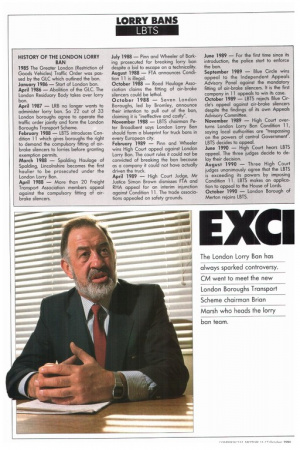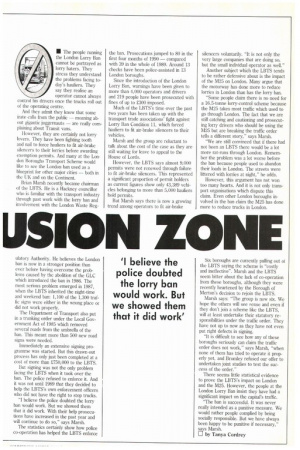EXC
Page 38

Page 39

If you've noticed an error in this article please click here to report it so we can fix it.
1
Us
1
CON ZONE
ulatory Authority. He believes the London ban is now in a stronger position than ever before having overcome the problems caused by the abolition of the GLC which introduced the ban in 1986. The most serious problem emerged in 1987, when the LBTS inherited the night-time and weekend ban: 1,100 of the 1,300 traffic signs were either in the wrong place or did not work properly.
The Department of Transport also put in a trunking order under the Local Government Act of 1985 which removed several roads from the umbrella of the ban. This meant more than 500 new road signs were needed.
Immediately an extensive signing programme was started. But this drawn-out process has only just been completed at a cost of more than 2750,000 to the LBTS.
But signing was not the only problem facing the LBTS when it took over the ban. The police refused to enforce it. And it was not until 1989 that they decided to help the LBTS's own enforcement officers who did not have the right to stop trucks.
"I believe the police doubted the lorry ban would work. But we showed them that it did work. With their help prosecutions have increased in the past year and will continue to do so," says Marsh.
The statistics certainly show how police co-operation has helped the Lwrs enforce
Six boroughs are currently pulling out of the LBTS saying the scheme is "costly and ineffective". Marsh and the LBTS seem bitter about the lack of co-operation from these boroughs, although they were recently heartened by the Borough of Merton's decision to rejoin the LBTS.
Marsh says: –The group is now six. We hope the others will see sense and even if tlicy don't join a scheme like the LBTS, will at least undertake their statutory responsibilities under the traffic order. They have not up to now as they have not even put right defects in signing.
"It is difficult to see how any of these boroughs seriously can claim the traffic order does not work," says Marsh, "when none of them has tried to operate it properly yet, and Bromley refused our offer to undertaken joint studies to test the success of the order."
There seems little statistical evidence to prove the LBTS's impact on London and the M25. However, the people at the London Lorry Ban insist they have had a significant impact on the capital's traffic.
"The ban is successful. It was never really intended as a punitive measure. We would rather people complied by being socially responsible. But we have always been happy to be punitive if necessary," says Marsh.
LI by Tanya Cordrey
























































































